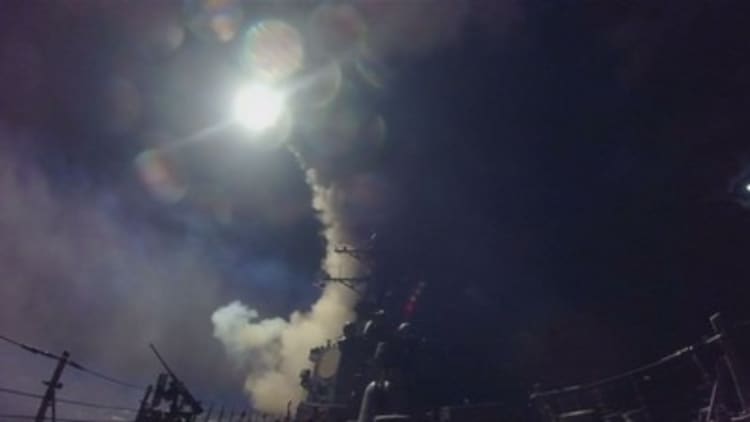
The U.S. Ambassador to the United Nations Nikki Haley on Sunday declared that the administration does not see peace and stability in Syria with Syrian President Bashar al-Assad still in power.
On Sunday's "Meet The Press," Haley told host Chuck Todd, "In no way do we look at peace happening in that area with Iranian influence. In no way do we see peace in that area with Russia covering up for Assad. In no way do we see peace in that area with Assad as the head of the Syrian government."
"We have to make sure that we're pushing that process," she continued. "The political solution has to come together for the good of the people of Syria."
Haley noted that the United States' first priority is still to defeat ISIS, but that there can be "multiple priorities."
"So you know, of course, it's to defeat ISIS," she said. "I mean, we've got to do that for peace and stability in the area. It's also to get out the Iranian influence, which we think is causing so much friction and worse issues in the area. And then we've got to go and make sure that we actually see a leader that will protect his people. And clearly, Assad is not that person."
On Thursday night, President Donald Trump ordered Tomahawk cruise missile strikes on a Syrian airfield in response to what the United States believes was a chemical weapons attack at the hands of Syrian President Bashar al-Assad.
The strikes have raised a slew of questions about the Trump administration's ultimate goals for Syria. Haley said on Sunday that it was up to the United States to take some burden in reacting to atrocities like this.
"The United States fought for the people of Syria and told Assad, 'No more,' she said. "And I think that's something that was strong for the United States to do. And I think it was needed. I think we desperately needed to send a message that, 'You know what? Russia's not going to have your back anymore. And if they do, we're going to make sure that both of you know that we're not going to settle for it.'"
But Haley also said that it shouldn't be dependent on the United States to take more military action to achieve what they want to see.
"I think that's dependent on the actors that are at play. I mean, this is a very complicated situation. We know there's no easy solution to the crisis that's in Syria. But our focus is to make sure that, you know, we're focused on strengthening the cease fire."
Haley also questioned Russia's first reactions to the attack. Russia is backing Syrian Assad's regime in Syria's ongoing civil war.
More from NBC News:
Trump's Syria Airstrike Sends a 'Critical Message': Ex-Pentagon Official
Supporters Back Trump After Syrian Strike, But Decision Rankles Some on Far-Right
Sebastian Gorka Made Nazi-Linked Vitezi Rend 'Proud' By Wearing Its Medal
"You know, the interesting thing, Chuck, is, when this chemical weapons murder happened to so many people, Russia's reaction was not, 'Oh, how horrible,' or, 'How could they do this to innocent children,' or, 'How awful is that?' Their initial reaction was, 'Assad didn't do it. The Syrian government didn't do it,'" Haley said.
Moscow called the U.S. airstrike an "act of aggression" and an "egregious and obvious violation of international law that cannot be justified."
"Why were they that defensive that quick?" asked Haley. "The idea of the casualties came after. The first priority for them was to cover for Assad."
The strikes this week were a startling reversal from many of Trump's comments as a citizen. Over the last several years, he repeatedly warned against United States military intervention into the Syrian conflict, sending tweets like, "We should stay the hell out of Syria, the "rebels" are just as bad as the current regime. WHAT WILL WE GET FOR OUR LIVES AND $ BILLIONS?ZERO."
Haley declined to speculate on what the president was thinking at that point.
"I don't know what his thought process was in 2013," she said. "And I'm not going to attempt to try and explain that. What I can tell you is, through the meetings we had all this week, what you saw was a president that was disgusted by what the Assad regime did to those innocent people."

